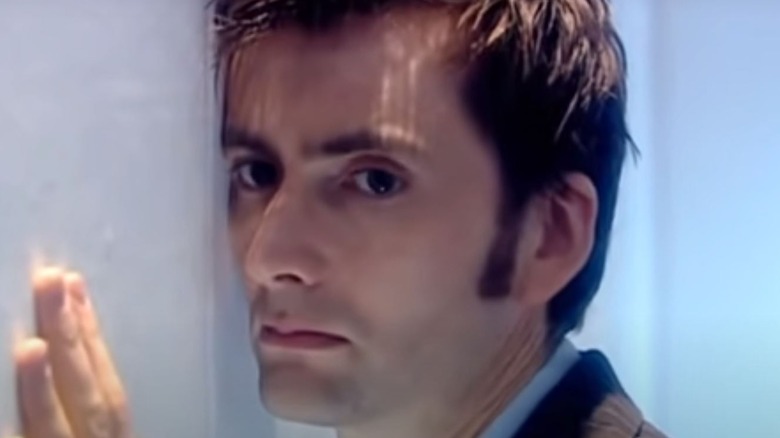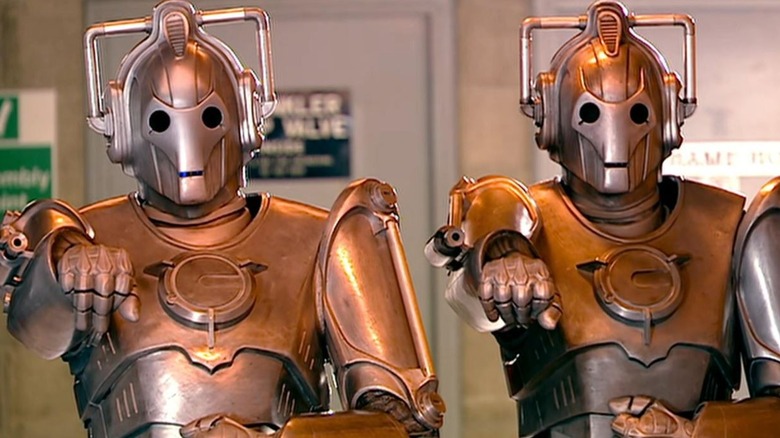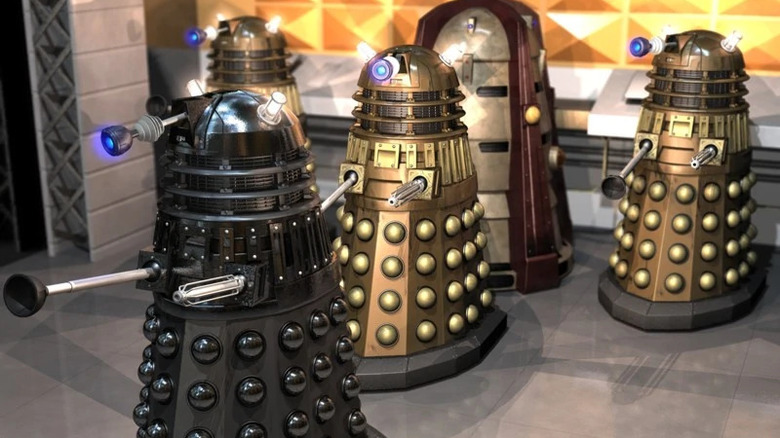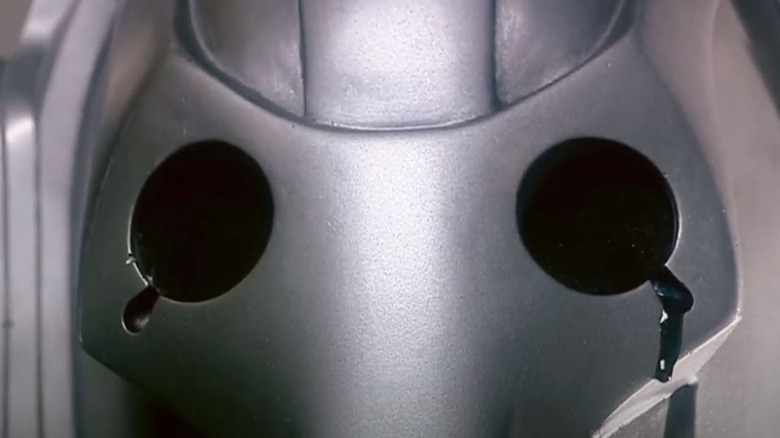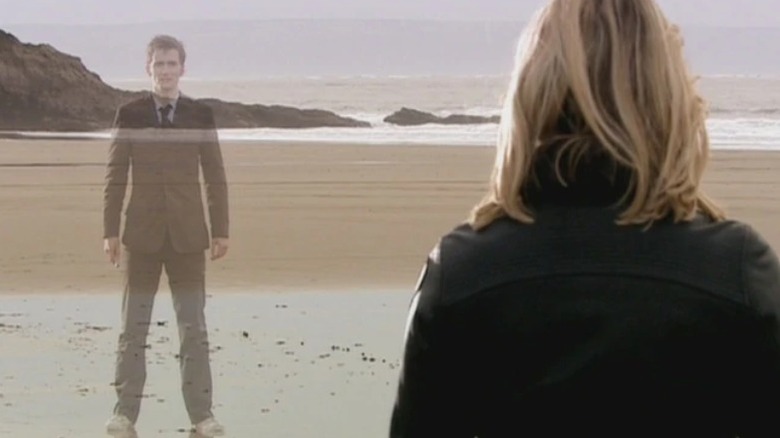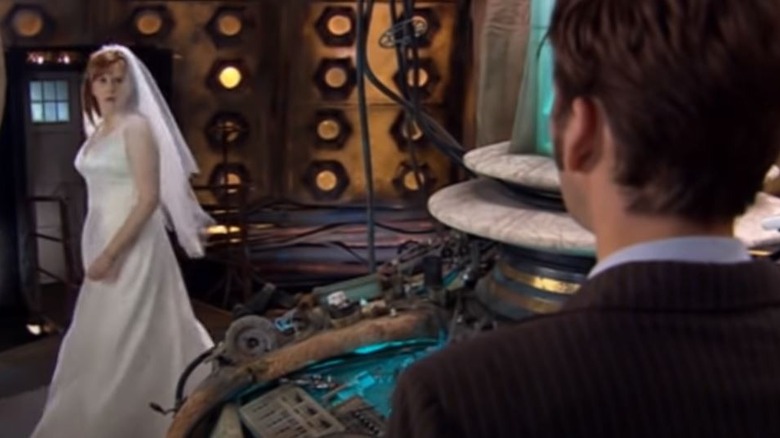The Ending Of Doctor Who Season 2 Explained
The modern era of "Doctor Who" started with a bang when Christopher Eccleston's leather jacket-rocking Ninth Doctor re-established the Gallifreyan time traveler's show from an entertainingly budget-restrained nostalgia trip to a contemporary cultural force. However, Eccleston left "Doctor Who" after just one season in the role, which could have left the BBC in a bit of a bind if it wasn't for the fortunate fact that the Doctor is famously able to regenerate into different-looking incarnations of himself. Even more fortunately, the man introduced as Eccleston's replacement in the lead role was none other than David Tennant, whose Tenth Doctor is arguably the most popular incarnation of modern "Doctor Who."
With this background, the second season (or "series," as the British naming customs dictate) of new "Doctor Who" is an incredibly important landmark in the annals of the show. Not only does it confirm that "nu-Who" is able to pull off the regeneration-induced actor switch that's so integral to the classic show, but it also does a pretty great job at introducing the world to Tennant's beloved take on the character. It also reintroduces the beloved cybermen in the show's rogues gallery, and amps up the Dalek threat from Season 1's sole survivor. But how does the season end, and what does it mean for the seasons that follow? Let's take a look.
Alternate-universe Cybermen are back ... again
"Doctor Who" Season 2 does plenty of legwork to establish the new incarnation of the Doctor, and as such, it features a bunch of more or less self-contained monster-of-the-week episodes that allow the Tenth Doctor to develop into the kind of man fans know and love. However, apart from the two-part combo of "The Impossible Planet" and "The Satan Pit" — which introduces the peaceful Ood and puts the Doctor against a massive demonic crature known as the Beast — the most obvious arc of the season is all about one classic villain faction: The Cybermen.
Cybermen from parallel universe stomp their way in the show's modern era in the appropriately titled Episode 5, "Rise of the Cybermen," and its second part, "The Age of Steel." The viewer would be forgiven for thinking that this is the last we hear from them. Nevertheless, the metallic foes return in the season's last two episodes. First one of the grand revelations in the penultimate episode, "Army of Ghosts," is that the titular silhouette ghosts are actually yet another manifestation of alternate-universe Cybermen breaking through. In the final episode, "Doomsday," they're one of the two villain groups waging war all over the place.
The huge focus on Cybermen is understandable, because apart from the appearance of a Cyberman head in Season 1 episode "Dalek," this is the first time audiences of new "Doctor Who" meet the iconic and visually captivating cyborgs.
The Cult of Skaro re-establishes Daleks as a major threat
As if a legion of alternate universe Cybermen wasn't bad enough, it turns out that the metal men have only been mooching off the reality-traveling shenanigans of the true threat of the season's ending: The Cult of Skaro, which turns out to be a four-strong team of extremely powerful and unusually clever Daleks, tasked with inventing outside-the-box tactics for conquest and survival.
Though they're a very late addition to the Season 2 game, the Skaro cultists immediately manage to establish themselves as a massive threat. Hilariously enough, this happens in a no-holds-barred sass battle between them and the Cybermen. When a Dalek notes that its species has no concept of elegance, a Cyberman immediately pounces in. "This is obvious," it points out the Daleks' iconically awkward salt-shaker-with-a-plunger design.
However, it's the Daleks who ultimately mop the floor with their opponent. "This is not war, this is pest control," they state when the Cybermen start talking about warfare. When the cyborgs express doubt about the four Daleks' ability to win against a massive Cyberman army, the Daleks remain confident and note that there's only one thing Cybermen are superior at. "You are better at dying," the Daleks declare.
The Cult of Skaro goes on to back up their big talk by absolutely crushing the Cybermen — and bringing a Dalek army in the universe with the help of a handy Time Lord gadget. Unlike the Season 1 episode "Dalek," which was all about a single, desperate Dalek, this is the mutant race at their most powerful and dangerous. What a way to introduce their true force in new "Doctor Who."
Doctor Who fans, meet Torchwood
Apart from doing some incredibly heavy lifting to re-establish two of the most famous classic "Doctor Who" monsters in the new series, the ending of "Doctor Who" Season 2 introduces the Torchwood Institute — a top-secret British paranormal-focused agency founded by Queen Victoria (Pauline Collins) after her encounter with Rose (Billie Piper) and the Doctor in the episode "Tooth and Claw." Torchwood and its leader, Yvonne Hartman (Tracy-Ann Oberman), make their proper first appearance in the season's penultimate episode, and the agency immediately establishes itself as one of the more dangerous workplaces in the show. Notably, Hartman's controversial tenure as the head of the institute comes to a close in a grisly way when she's painfully turned into a Cyberman, yet remains self-aware — and, as it turns out, capable of feeling emotions and even crying.
As "Doctor Who" stories go, that's pretty grim ... but as it turns out, Torchwood Institute has plenty more in store. The Doctor's ally, Jack Harkness (John Barrowman), assumes control of the Torchwood Three facility in the "Torchwood" spin-off, and while his team's attempts to control various extraterrestrial threats are somewhat "Doctor Who"-esque, things are considerably darker in their corner of the Who-niverse. Let's just say that as far as Torchwood employees' occupational hazards go, Hartman's awful fate is far from an anomaly.
Hartman's fate also reaffirms a plot point from the Cybermen's earlier appearance: Sure, the Daleks might be the stronger monsters, but the Cybermen's true terror and might is their ability to upgrade people into one of them, condemning the victim to a horrific existence as part of a cyborg hivemind.
A romantic Doctor and a parallel universe
The Doctor has, on occasion, been a dashing and romantic figure, but Season 2 of "Doctor Who" establishes David Tennant's Tenth Doctor as possibly the most romantic one of them all. Unlike the intense and guilt-ridden Ninth Doctor, Ten is friendly, energetic, and surprisingly human. After initial difficulties brought on by his regeneration, he gets on with Rose Tyler (Billie Piper) like a house on fire. They soon develop a bit of a will-they-won't-they dynamic — much to the chagrin of Rose's boyfriend Mickey Smith (Noel Clarke), who decides to remain in a parallel universe halfway through the season, in no small part because he recognizes his third wheel status.
Parallel universes feature heavily in the season, and much like Mickey, Rose ultimately exits the TARDIS by also exiting her home universe. However, in her case, the departure from the main universe is far from voluntary. She nearly becomes collateral to the Doctor's plan to throw the rampaging Cybermen and Daleks into the Void, but Pete Tyler (Shaun Ringwall) manages to pull her into the same alternate universe Mickey and Jackie (Camille Coduri) stayed in, where she's left stranded.
The Doctor eventually uses up the energy of an entire sun to project his image into the other universe, and has a final conversation with Rose. She confesses her love to him, and while the transmission cuts before the Doctor gets to reply, his shocked state afterwards is a pretty clear indication of his feelings.
Tennant's Doctor isn't the first or last one to entertain the possibility of romance, but if it wasn't clear before, this moment finally confirms his romantic tendencies — and sets up Rose as his lost love to fuel Ten's melancholic tendencies.
A mystery bride arrives
Fair warning: If you haven't watched "Doctor Who" beyond this season, it's probably better to stop reading at this point and move on to Season 3 — via the Christmas Special that comes between the seasons, of course.
The ending of "Doctor Who" Season 2 effectively removes Rose from the equation, leaving the Doctor resigned to resume his travels alone. However, the very end of the season finale deals one last plot twist in the form of a mysterious and extremely annoyed bride, who unexpectedly manifests aboard TARDIS.
If you've already proceeded beyond Season 2, you know what's happening. This rather shrill moment not only kicks off the upcoming Christmas Special, "The Runaway Bride," but it also introduces the Whoniverse to Donna Noble (Catherine Tate). Initially, Donna seems to be a one-off character, but she returns for Season 4 as a regular and matures into a popular "Doctor Who" companion who has a radically different relationship with the good Doctor than Rose Tyler — or her immediate successor, Martha Jones (Freema Agyeman).
The Tenth Doctor is very, very good at abrupt mood shifts, and the series of flat, yet increasingly bewildered "What?" queries he delivers upon seeing the mysterious visitor is one of Tennant's all-time greats. This small cliffhanger at the very end of "Doomsday" allows "Doctor Who" Season 2 to dodge a total downer ending, and proves that even in the throes of sorrow, the Doctor's innate curiosity and bewilderment remain intact.
